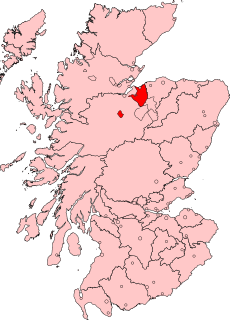Related Research Articles
Aberdeenshire was a Scottish county constituency of the House of Commons of the Parliament of Great Britain from 1708 to 1800 and of the House of Commons of the Parliament of the United Kingdom from 1801 until 1868.
Ayrshire was a county constituency of the House of Commons of the Parliament of Great Britain from 1708 to 1800 and of the House of Commons of the Parliament of the United Kingdom from 1801 until 1868, when it was divided into North Ayrshire and South Ayrshire.
Anstruther Burghs was a district of burghs constituency of the House of Commons of the Parliament of Great Britain from 1708 to 1800 and of the House of Commons of the Parliament of the United Kingdom from 1801 to 1832.
Berwickshire was a county constituency of the House of Commons of the Parliament of the United Kingdom from 1708 to 1918, when it was amalgamated with neighbouring Haddington(shire) to form a new Berwick and Haddington constituency.

Ross-shire was a Scottish county constituency of the House of Commons of the Parliament of Great Britain from 1708 to 1801 and of the Parliament of the United Kingdom from 1801 to 1832.
Roxburghshire was a Scottish county constituency of the House of Commons of the Parliament of Great Britain from 1708 to 1801, and of the Parliament of the United Kingdom from 1801 to 1918.

Dumfriesshire was a county constituency represented in the House of Commons of Great Britain from 1708 to 1801 and in the House of Commons of the Parliament of the United Kingdom from 1801 until 2005. It was known as Dumfries from 1950.
Peeblesshire was a Scottish county constituency of the House of Commons of the Parliament of the United Kingdom (Westminster) from 1708 until 1868. It elected one Member of Parliament (MP) by the first past the post voting system.
Fife was a county constituency represented in the House of Commons of the Parliament of the United Kingdom from 1708 until 1885, when it was divided into East Fife and West Fife.
Caithness was a county constituency of the House of Commons of the Parliament of Great Britain from 1708 to 1801 and of the Parliament of the United Kingdom from 1801 to 1918.
Cromartyshire was a county constituency of the House of Commons of Great Britain from 1708 until 1800, and of the House of Commons of the United Kingdom from 1801 to 1832.

Nairnshire was a county constituency of the House of Commons of Great Britain from 1708 until 1800, and of the House of Commons of the United Kingdom from 1801 to 1832.
Tain Burghs, was a constituency of the House of Commons of the Parliament of Great Britain from 1708 to 1801 and of the Parliament of the United Kingdom from 1801 to 1832, sometimes known as Northern Burghs. It was represented by one Member of Parliament (MP).
Kincardineshire was a constituency of the House of Commons of the Parliament of Great Britain from 1708 to 1801 and of the Parliament of the United Kingdom from 1801 to 1918. It was represented by one Member of Parliament (MP).
Stirlingshire was a Scottish county constituency of the House of Commons of the Parliament of Great Britain and later of the Parliament of the United Kingdom from 1708 until 1918. It elected one Member of Parliament (MP) by the first past the post voting system.

Clyde Burghs, also known as Glasgow Burghs, was a district of burghs constituency of the House of Commons of Great Britain from 1708 to 1801 and of the House of Commons of the United Kingdom from 1801 to 1832. It elected one Member of Parliament (MP).
Perthshire was a Scottish county constituency of the House of Commons of the Parliament of Great Britain from 1708 to 1801 and of the Parliament of the United Kingdom from 1801 until 1885, representing a seat for one Member of Parliament (MP).
Renfrewshire was a county constituency of the House of Commons of the Parliament of Great Britain from 1708 until 1801 and of the Parliament of the United Kingdom from 1801 to 1885.
Lanark Burghs was a district of burghs constituency of the House of Commons of the Parliament of the United Kingdom from 1708 to 1832, representing a seat for one Member of Parliament (MP).
Kinross-shire was a county constituency of the House of Commons of Great Britain from 1708 until 1800, and of the House of Commons of the United Kingdom from 1801 to 1832.
References
- ↑ "Clackmannanshire". History of Parliament Online (1690-1715). Retrieved 27 March 2019.
- ↑ "Clackmannanshire". History of Parliament Online (1715-1754). Retrieved 27 March 2019.
- ↑ "Clackmannanshire". History of Parliament Online (1754-1790). Retrieved 27 March 2019.
- ↑ "Clackmannanshire". History of Parliament Online (1790-1820). Retrieved 27 March 2019.
- ↑ "Clackmannanshire". History of Parliament Online (1820-1832). Retrieved 27 March 2019.
- 1 2 D. W. Hayton, Clackmannanshire in The History of Parliament: the House of Commons 1690-1715 (2002).
- 1 2 3 J. M. Simpson, Clackmannanshire in The History of Parliament: the House of Commons 1715-1754 (1970).
- 1 2 3 4 Edith, Lady Haden-Guest, Clackmannanshire in The History of Parliament: the House of Commons 1754-1790 (1964).
- ↑ Edith, Lady Haden-Guest, CATHCART, Hon. Charles Allan (1759-88), of Sauchie, Clackmannan. in The History of Parliament: the House of Commons 1754-1790 (1964).
- 1 2 3 4 5 6 R. G. Thorne, Clackmannanshire in The History of Parliament: the House of Commons 1790-1820 (1986).
- ↑ R. G. Thorne, ABERCROMBY, Sir John (1772-1817), of Tullibody, Clackmannan. in The History of Parliament: the House of Commons 1790-1820 (1986).
- 1 2 3 David R. Fisher, Clackmannanshire in The History of Parliament: the House of Commons 1820-1832 (2009).